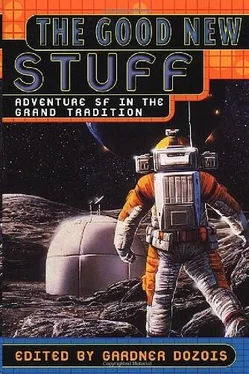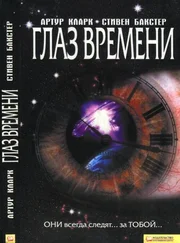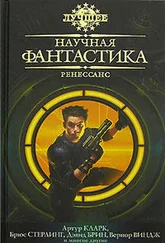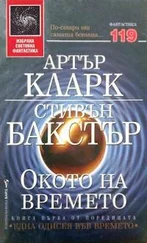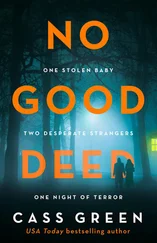Стивен Бакстер - The Good New Stuff
Здесь есть возможность читать онлайн «Стивен Бакстер - The Good New Stuff» весь текст электронной книги совершенно бесплатно (целиком полную версию без сокращений). В некоторых случаях можно слушать аудио, скачать через торрент в формате fb2 и присутствует краткое содержание. Год выпуска: 2002, ISBN: 2002, Издательство: St. Martin's Griffin, Жанр: Фантастика и фэнтези, на английском языке. Описание произведения, (предисловие) а так же отзывы посетителей доступны на портале библиотеки ЛибКат.
- Название:The Good New Stuff
- Автор:
- Издательство:St. Martin's Griffin
- Жанр:
- Год:2002
- ISBN:0-312-26456-9
- Рейтинг книги:3 / 5. Голосов: 1
-
Избранное:Добавить в избранное
- Отзывы:
-
Ваша оценка:
- 60
- 1
- 2
- 3
- 4
- 5
The Good New Stuff: краткое содержание, описание и аннотация
Предлагаем к чтению аннотацию, описание, краткое содержание или предисловие (зависит от того, что написал сам автор книги «The Good New Stuff»). Если вы не нашли необходимую информацию о книге — напишите в комментариях, мы постараемся отыскать её.
The Good New Stuff — читать онлайн бесплатно полную книгу (весь текст) целиком
Ниже представлен текст книги, разбитый по страницам. Система сохранения места последней прочитанной страницы, позволяет с удобством читать онлайн бесплатно книгу «The Good New Stuff», без необходимости каждый раз заново искать на чём Вы остановились. Поставьте закладку, и сможете в любой момент перейти на страницу, на которой закончили чтение.
Интервал:
Закладка:
"What is it you intend to do?"
"Your race is a very vigorous one. I expect it to be here, competing with us, within five hundred years. Perhaps much sooner. It will be necessary to make a thorough study of such a rival. I invite you to join our community on a permanent basis."
"What do you mean?"
"I invite you to become a symbiote. I have here a male and a female, whose genes are altered and therefore without defects. You make a perfect breeding pair. It will save me a great deal of trouble with cloning."
"You think I'll betray my race and deliver a slave species into your hands?"
"Your choice is simple, Captain-Doctor. Remain an intelligent, living being, or become a mindless puppet, like your partner. I have taken over all the functions of her nervous system; I can do the same to you."
"I can kill myself."
"That might be troublesome, because it would make me resort to developing a cloning technology. Technology, though I am capable of it, is painful to me. I am a genetic artifact; there are fail-safes within me that prevent me from taking over the Nest for my own uses. That would mean falling into the same trap of progress as other intelligent races. For similar reasons, my life span is limited. I will live for only a thousand years, until your race's brief flurry of energy is over and peace resumes once more."
"Only a thousand years?" Afriel laughed bitterly. "What then? You kill off my descendants, I assume, having no further use for them."
"No. We have not killed any of the fifteen other races we have taken for defensive study. It has not been necessary. Consider that small scavenger floating by your head, Captain-Doctor, that is feeding on your vomit. Five hundred million years ago its ancestors made the galaxy tremble. When they attacked us, we unleashed their own kind upon them. Of course, we altered our side, so that they were smarter, tougher, and, naturally, totally loyal to us. Our Nests were the only world they knew, and they fought with a valor and inventiveness we never could have matched…. Should your race arrive to exploit us, we will naturally do the same."
"We humans are different."
"Of course."
"A thousand years here won't change us. You will die and our descendants will take over this Nest. We'll be running things, despite you, in a few generations. The darkness won't make any difference."
"Certainly not. You don't need eyes here. You don't need anything."
"You'll allow me to stay alive? To teach them anything I want?"
"Certainly, Captain-Doctor. We are doing you a favor, in all truth. In a thousand years your descendants here will be the only remnants of the human race. We are generous with our immortality; we will take it upon ourselves to preserve you."
"You're wrong, Swarm. You're wrong about intelligence, and you're wrong about everything else. Maybe other races would crumble into parasitism, but we humans are different."
"Certainly. You'll do it, then?"
"Yes. I accept your challenge. And I will defeat you."
"Splendid. When the Investors return here, the springtails will say that they have killed you, and will tell them to never return. They will not return. The humans should be the next to arrive."
"If I don't defeat you, they will."
"Perhaps." Again it sighed. "I'm glad I don't have to absorb you. I would have missed your conversation."
Michael Swanwick
THE BLIND MINOTAUR
One of the most popular and respected of all the new writers who entered the field in the eighties, Michael Swanwick made his debut in 1980 with two strong and compelling stories, "The Feast of St. Janis" and "Ginungagap," both of which were Nebula Award finalists that year, and which were both selected either for a Best of the Year anthology or for that year's annual Nebula Awards volume— as auspicious a debut as anyone has ever made.
He stayed in the public eye, and on major award ballots, throughout the rest of the eighties with intense and powerful stories such as "Mummer Kiss," "The Man Who Met Picasso," "Trojan Horse," "Dogfight" (written with William Gibson), "Covenant of Souls," "The Dragon Line," "Snow Angels," "A Midwinter's Tale," and many others— all of which earned him a reputation as one of the most powerful and consistently inventive short-story writers of his generation. Nor has his output of short fiction slackened noticeably in the nineties, in spite of a burgeoning career as a novelist, and recent years have seen the appearance of major Swanwick stories such as "The Edge of the World," "The Changeling's Tale," "Griffin's Egg," "Cold Iron," and "The Dead," which was on the final Hugo ballot in 1997 and is on the Nebula final ballot as I type these words in 1998; he remains one of SF's most prolific writers at short lengths, writing and selling seven or eight new stories in 1997 alone, for instance. By the end of the nineties, his short work had won him several Asimov's Reader's Awards, a Sturgeon Award, and the World Fantasy Award (for his bizarre and powerful after-death fantasy "Radio Waves").
At first, his reputation as a novelist lagged behind his reputation as a short-story writer, with his first novel, In the Drift— published in 1985 as part of Terry Carr's resurrected Ace Specials line, along with first novels by William Gibson, Kim Stanley Robinson, and Lucius Shepard— largely ignored by critics, and panned by some of them. His second novel, though, the critically acclaimed Vacuum Flowers, caused a stir, and his third and perhaps best-known novel, Stations of the Tide, established him firmly among the vanguard of the hot novelists of the nineties; Stations of the Tide won him a Nebula Award in 1991. His next novel, The Iron Dragon's Daughter, a finalist for both the World Fantasy Award and the Arthur C. Clarke Award (a unique distinction!), explored new literary territory on the ambiguous borderland of science fiction and fantasy, and has been hailed by some critics as the first example of an as yet still nascent subgenre called "Hard Fantasy" (sort of a mix between the Dickensian sensibilities of "steampunk," high-tech science fiction, and traditional Tolkienesque fantasy). His most recent novel, Jack Faust, a sly reworking of the Faust legend that explores the unexpected impact of technology on society, blurs genre boundaries even more, and has garnered rave reviews from nearly every source from The Washington Post to Interzone.
Swanwick is a chameleonic writer, difficult to pin down as belonging firmly to one aesthetic camp or another. He writes everything from hard-science to Tolkienesque fantasy, but puts his own unique spin on everything he writes. During the eighties, during the Cyberpunk Wars, most critics included him in the cyberpunk camp, although the cyberpunks themselves never really seemed to accept him as One of Them, in spite of his famous collaboration with Gibson on "Dogfight," and in spite of the fact that Vacuum Flowers is usually listed as part of the cyberpunk canon by outside critics who are not themselves cyberpunks— and indeed, whatever it was that he was doing that made him appear to some to be writing cyberpunk, he was doing it on his own in stories such as "Ginnungagap" — published in 1980— before the cyberpunks themselves were publishing much that looked like cyberpunk, certainly long before the publication of Gibson's Neuromancer in 1985. So it was a matter of convergent evolution rather than influence, I think, as far as Swanwick's relationship to cyberpunk is concerned. Similarly, Swanwick is now widely accepted as having written one of the two main "Post-Cyberpunk" works with Stations of the Tide (the other is Neal Stephenson's Snow Crash)— but if you go back and look at works such as "Ginnungagap," you can see that he was writing stuff that resembles "post-cyberpunk" then, before the Cyberpunk Revolution had even really gotten underway. So pinning him down to one of these categories is rather like trying to catch fog in a net.
Читать дальшеИнтервал:
Закладка:
Похожие книги на «The Good New Stuff»
Представляем Вашему вниманию похожие книги на «The Good New Stuff» списком для выбора. Мы отобрали схожую по названию и смыслу литературу в надежде предоставить читателям больше вариантов отыскать новые, интересные, ещё непрочитанные произведения.
Обсуждение, отзывы о книге «The Good New Stuff» и просто собственные мнения читателей. Оставьте ваши комментарии, напишите, что Вы думаете о произведении, его смысле или главных героях. Укажите что конкретно понравилось, а что нет, и почему Вы так считаете.
